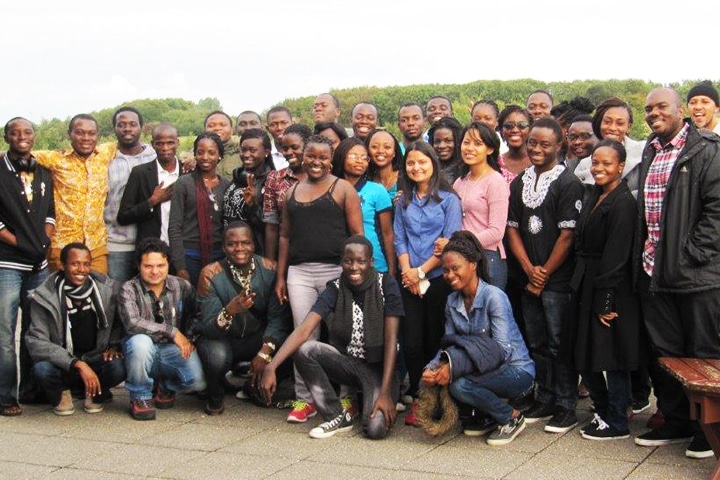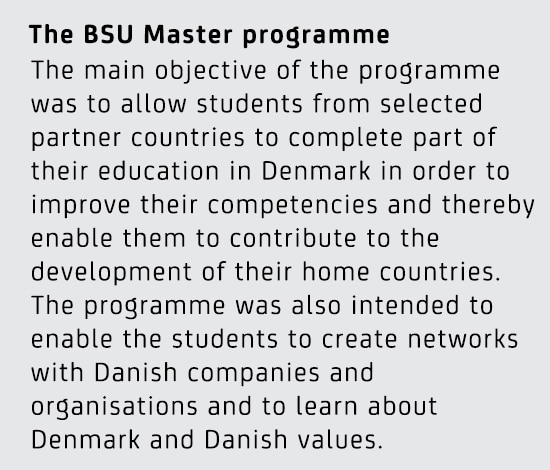Well done BSU Masters! The BSU Master Scholarship programme has ended and it’s been a success so far
29-11-17

From 2013 to 2017, 74 talented students from universities in Kenya, Tanzania, Uganda, Ghana and Nepal, completed their master studies in Denmark and the overall result was excellent.
The BSU masters group was quite simply a bunch of highly talented, diligent students and they completed their course in the best possible way. Each of them focused on important development issues in their final thesis, says Lene C. Mosegaard, the programme manager.

Global demand for talented youth
Former Minister of Development Cooperation, Christian Friis Bach initiated the BSU Master Scholarship programme. One of his arguments for the programme was that it was of mutual benefit to Denmark and Denmark’s partner countries in the global South.
– Many students do not get the education they dream of. We can offer some of these students the opportunity to come to Denmark, so that they after their studies can return home and help build up their own communities.
– The network they develop will be beneficial for Danish companies. Many of these countries have big growth rates. Ghana, for example, has an annual growth rate of 15 per cent.
–It is no coincidence that countries like the UK, USA and Germany provide a significant number of scholarships to global talent. This gives their companies access to talented students from all over the world, leading to much needed innovations and the opening up of new markets.
These are some of the comments that Christian Friis Bach made in the Danish newspaper, Jyllands-Posten, September 3rd, 2012.
Preliminary results
It is still too early to measure the impact of the programme and a future survey will hopefully provide a more accurate picture of how and whether the goals have been achieved. So far, the end of study survey shows the following results:
– About 70 % of the BSU graduates returned home immediately after their studies and many resumed their previous jobs or found new jobs within their field of study.
– About 20 – 30 % had no job to return to (most of these students were from Ghana). As a result, they applied for jobs, PhDs or master studies in Denmark or in other countries such as Finland, Turkey, USA and Australia, and some of them have been successful.
– Many said that it was difficult to establish real contact with Danish students, whereas is was much easier with other international students.
– Most of the graduates found it difficult to make contact with Danish companies and organisations, either because internships were not part of their study programmes, or because it turned out to be difficult for the students to find internship positions (only 8 succeeded in finding an internship).
These survey results match Lene Mosegaard’s own experience of the Master programme. She thinks that after only 4 years it ended too soon. It always takes time to develop a new programme with many stakeholders and to make the necessary adjustments based on the lessons learnt from the experience made along the way.
In the first years of the BSU Master Programme, there was much focus on improving admission criteria and procedures, and securing ownership of the BSU affiliated universities in the South. When the first group had graduated, it became apparent that new tools were needed to help the students network with Danish students and companies. These new tools could have helped the students create new and innovative jobs in their home countries, but, unfortunately, the programme ended, before such tools were fully developed and in place.
Lene Mosegaard’s assessment echoes the graduates’ own feedback. They clearly appreciated the administration and academic level of the programme, but they would have liked the programme to have created links to Danish companies and organisations, thereby making it more likely that the students would participate in advancing cooperation between their own countries and Denmark. In the words of two of the BSU Master graduates,
“BSU was a great opportunity. And it is sad that this is going to be the last of it. I would kindly ask DFC to please link alumni with any job opportunities that become available. This will enhance the connection and strong bonds that already exist.”
“The BSU programme should also focus on establishing and building a strong network between Danish companies/businesses/entities and those from the participating countries. In collaboration with Danish students/businesses, the BSU graduates should be able to identify opportunities for business partnerships between the two countries. More partnership meetings are key in addition to the usual classes to make the programme more complete and meaningful to both countries.”
Danida Alumni Network – one of the new tools
The Danida Alumni Network was launched in 2016 to promote cooperation among present and former Danida fellows and Danish stakeholders. Among the more than 20,000 Danida alumni that have received a Danida fellowship since the 1960s about 2,000 have now registered at the Danida Alumni Network portal.
The newly established Danida Alumni Network was one of the tools set up to establish a network of relevant companies and organisations interested in contacting the BSU students for current (e.g. through internships) or future collaboration.
Donor countries’ increased focus on job creation and entrepreneurship
Graduates’ need of job, particularly in Africa, was also on the agenda at the annual Donor Harmonisation Group’s meeting in Stockholm about higher education earlier this year.
Germany, Sweden, France and Holland are increasing the number of scholarships they grant to young talent and they focus on how to foster entrepreneurship and innovation in the South as part of, or as a supplement to, their courses in collaboration with companies. In Germany, they are looking for alternative funding in terms of business angles, EU and the World Bank to support start-ups and business plan competitions.
Read more about the talented BSU Masters and their achievements here:
http://dfcentre.com/from-bsu-master-to-unleash/
http://dfcentre.com/seeds-for-the-future/
http://dfcentre.com/when-plastic-is-not-fantastic/
http://dfcentre.com/beyond-academics/
To ensure the necessary academic level, the scholarship programme was anchored in the Building Stronger Universities (BSU) initiative supported by the Danish Ministry of Foreign Affairs. See more here.
Go back to our stories